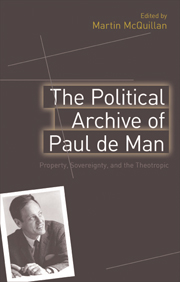Book contents
- Frontmatter
- Contents
- List of Abbreviations
- Acknowledgements
- Notes on Contributors
- Introduction: Broken Promises: Rousseau, de Man and Watergate
- 1 Lovence in Rousseau's Julie ou la Nouvelle Héloïse
- 2 Reading Spectacles in Rousseau's Letter to d'Alembert
- 3 The Utter Misery of the Human Mind: Apotropaic and Theotropic in de Man's Rousseau
- 4 Rhetoric and Rausch: de Man on Nietzsche on Value and Style
- 5 Theotropic Logology: J. Hillis Miller, Paul de Man and Kenneth Burke
- 6 Normativity, Materiality and Inequality: The Politics of the Letter in Paul de Man
- 7 Inscribing the Political: Paul de Man and the Wild Art of Letter Writing
- 8 Mistake in Paul de Man: Violent Reading and Theotropic Violence
- 9 Lightstruck: ‘Hegel on the Sublime’
- 10 De Man vs. ‘Deconstruction’: or, Who, Today, Speaks for the Anthropocene?
- 11 Paul de Man at Work: What Good is an Archive?
- 12 DNA: de Man's Nucleic Archive
- 13 Sovereign Debt Crisis: Paul de Man and the Privatization of Thought
- Appendix: Nietzsche I: Rhetoric + Metaphysics
- Index
2 - Reading Spectacles in Rousseau's Letter to d'Alembert
Published online by Cambridge University Press: 05 August 2013
- Frontmatter
- Contents
- List of Abbreviations
- Acknowledgements
- Notes on Contributors
- Introduction: Broken Promises: Rousseau, de Man and Watergate
- 1 Lovence in Rousseau's Julie ou la Nouvelle Héloïse
- 2 Reading Spectacles in Rousseau's Letter to d'Alembert
- 3 The Utter Misery of the Human Mind: Apotropaic and Theotropic in de Man's Rousseau
- 4 Rhetoric and Rausch: de Man on Nietzsche on Value and Style
- 5 Theotropic Logology: J. Hillis Miller, Paul de Man and Kenneth Burke
- 6 Normativity, Materiality and Inequality: The Politics of the Letter in Paul de Man
- 7 Inscribing the Political: Paul de Man and the Wild Art of Letter Writing
- 8 Mistake in Paul de Man: Violent Reading and Theotropic Violence
- 9 Lightstruck: ‘Hegel on the Sublime’
- 10 De Man vs. ‘Deconstruction’: or, Who, Today, Speaks for the Anthropocene?
- 11 Paul de Man at Work: What Good is an Archive?
- 12 DNA: de Man's Nucleic Archive
- 13 Sovereign Debt Crisis: Paul de Man and the Privatization of Thought
- Appendix: Nietzsche I: Rhetoric + Metaphysics
- Index
Summary
Paul de Man's original solution to the question of the relation of Rousseau's political to his autobiographical writings has not received the attention it deserves, in large part because his work on Rousseau's political writings has been less read – ignored by readers of de Man unfamiliar with the political dimension of Rousseau or unable to accept that a political dimension in de Man could be anything but guilty and repressed; and ignored by most writers on Rousseau's political theory, presumably as the analysis of a literary critic. Fewer still have attempted to relate the two sides of Rousseau's work in the light of de Manian discussions making allegory and irony the figural modes of political and autobiographical texts respectively. Most solutions tend to reconcile the two dimensions according to by-now-classical patterns laid down by Jean Starobinski and Ernst Cassirer, the first tending to make the systematic texts into disguised confessional works that illuminate the psychology of their writer, and the second finding in the autobiographical works the empirical evidence on which the theory is built and from which it does not quite manage to detach itself. The newly transcribed Textual Allegories – which reveals de Man's decision in Allegories of Reading to substitute a chapter on Rousseau's autobiographical texts for drafted chapters on Julie and Nietzsche that were to follow the chapter on The Social Contract in the first version – brings out the importance of the neglected relation in de Man's reading of Rousseau.
- Type
- Chapter
- Information
- The Political Archive of Paul de ManProperty, Sovereignty and the Theotropic, pp. 25 - 40Publisher: Edinburgh University PressPrint publication year: 2012



